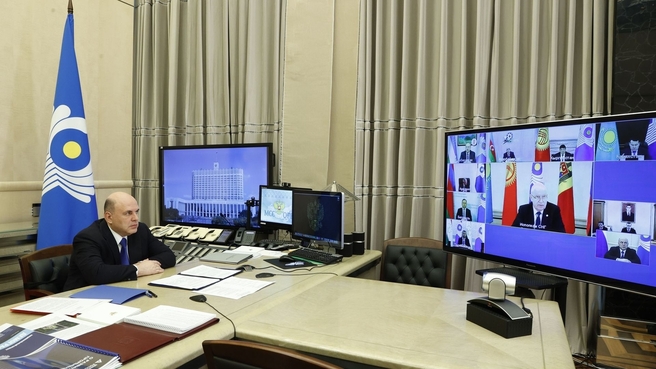RUSSIA, May 20 - The heads of government discussed topical matters related to the expansion of trade, economic, scientific and technological cooperation within the CIS. They focused on implementing joint agro-industrial projects, including those in the livestock breeding sector, and on efforts to consolidate the common scientific space of the CIS member states.
List of heads of delegations of the CIS member states
The heads of delegations of the CIS member states:
Prime Minister of the Republic of Azerbaijan Ali Hidayat oglu Asadov;
Acting Deputy Prime Minister of the Republic of Armenia Mher Grigoryan;
Prime Minister of the Republic of Belarus Roman Golovchenko;
Prime Minister of the Republic of Kazakhstan, Chairman of the CIS Council of Heads of Government Alikhan Smailov;
Prime Minister and Chief of Staff of the Presidential Executive Office of the Republic of Kyrgyzstan Akylbek Japarov;
Prime Minister of the Russian Federation Mikhail Mishustin;
Prime Minister of the Republic of Tajikistan Kohir Rasulzoda;
Deputy Prime Minister of the Republic of Turkmenistan Muhammetguly Muhammedov;
Prime Minister of the Republic of Uzbekistan Abdulla Aripov.
Mr Smailov, colleagues,
First of all, I would like to thank Mr Golovchenko and our Belarusian colleagues for this fruitful year and to wish Mr Smailov good luck and effective decisions as Chairman of the CIS Council of Heads of Government.
Once again, I would like to use this opportunity to cordially congratulate all the participants on the 77th anniversary of Victory in the Great Patriotic War. This sacred holiday and the memory of the feat of war veterans and home front workers unite our peoples.
I would like to emphasise that the Russian Federation attaches great importance to further developing the Commonwealth of Independent States. Our integration association has proved its effectiveness as an optimal venue for adopting joint decisions to strengthen trade, economic, scientific, technological, social, cultural and humanitarian cooperation in the interests of the population of the CIS member states.
Importantly, trade ties within the CIS got stronger at the end of last year despite the challenges facing the global economy. Russia's trade with its CIS neighbours grew by more than 30 percent to $96 billion. The CIS countries’ overall trade with other states and regional integration associations has also grown.
Our joint coronavirus response and relief efforts have been a vivid example of our constructive interaction. We expect to work in the same coordinated manner in other priority areas.
Of particular relevance are the coordinated actions of the CIS member states in the context of the unprecedented sanctions imposed on Russia and Belarus. The unfriendly states, which have unleashed a full-scale economic war against us, are pursuing their own opportunistic interests. Their goal is to cripple our national sovereignty, destroy the foundations of our statehood, and at any cost keep up the illusion of the dominance of the United States and the collective West in global politics and the economy. They are striving to gain non-competitive advantages and resolutely preclude the development of a system of fair and equitable interstate relations. And their most coveted objective is to bend to their will those who disagree with their claims to hegemony.
These unfriendly countries are not hiding their intentions to paralyse foreign trade with Russia, and inflict maximum damage to its economic and social development. However, given the globalised nature of the economy and trade, their sanctions – countered by our retaliatory measures – are boomeranging at the West.
These sanctions are also completely illegitimate under international law. They are disrupting trade and investment ties, and damaging the environment for doing business; they have brought the world to the brink of a major economic crisis fraught with dire consequences for all states.
It is obvious that the sanctions confrontation requires us to make certain adjustments to our cooperation. We will need to place greater emphasis on internal strength, opportunities and resources, find new areas for joint growth, boost the production of goods and services, strengthen technology and food security, raise our citizens’ living standards and stimulate business activity.
I would like to cite an example from the positive experience of the EAEU. In March, the Eurasian Economic Commission approved a list of measures to improve the resilience of its member economies, including their macroeconomic stability. They are being successfully implemented. Since the five EAEU members are also part of the CIS, I propose using this anti-crisis programme to strengthen trade and economic cooperation in the CIS.
A working group for monitoring the economic situation met at the end of April; it included representatives of governments, industry-specific CIS bodies and the interstate bank. They worked out specific proposals on responding to emerging challenges. This substantive work must continue.
More to be posted soon.

